Ajax Random Chess
Ajax Random Chess is a pseudo-Fischer Random Chess (FRC) variant, with Ajax Chessmen on an 8x8 board, that also features two Ajax-Minister's drops.
 ....
....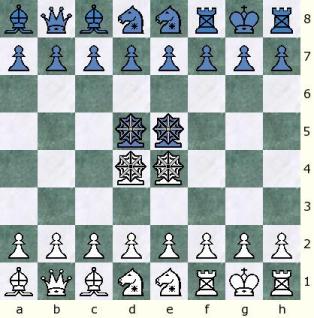
The 4 Ajax-Ministers in the center of the boards in the diagrams above are just for display purposes. They start off the board at the begining of the game.
The Ajax Random setup allows Bishops to start on the same color (sample diagram above right).
Just like in it's 8x8 Contemporary Random Chess cousin, there are 1,680 initial positions in Ajax Random Chess. Check the page on 'How to Generate Random Positions' to generate your random positions for OTB games.
Ajax Orthodox Chess

The specific Ajax Random Chess initial position RNBQKBNR is called Ajax Orthodox Chess.
A separate Game Courier preset is available below for this specific position, for players who want to try their Orthodox Chess opening theory knowledge with the new Ajax Chessmen, the two Minister drops and the King's Bunker Leap rule of Ajax Random Chess.
Setup
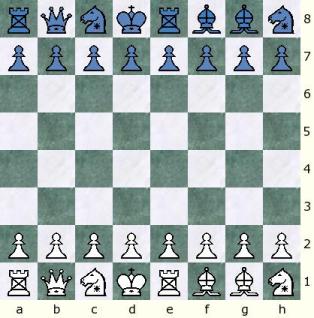 ....
....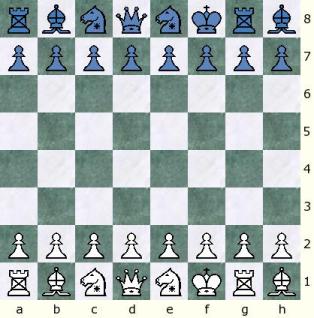
Pawns start on each players' 2nd rank, and the Ajax-Pieces are placed randomly in their 1st rank with the only restriction that the King is placed between the rooks to allow for the Fischer Random Chess' like castling rule.
There is direct symmetry accross the board between the white and black armies.
The Ajax Random Chess setup allows Bishops the possibility to start on the same color (sample diagram above right). The Bishop Adjustment Rule is not neccessary though, as the Ajax-Bishops have the ability to relocate (but not capture) orthogonally to the opposite color.
The Ajax-Ministers start off the board at the begining of the game.
Pieces
Ajax Chess pieces inspired by the Man or Commoner from Courier Chess are used.All regular minor chess pieces (Rook, Bishop and Knights) move as in Orthodox Chess, with the additional feature that they can also move (but not capture! see below) as Courier Chess' Man (or Commoner): one square in any arbitrary direction, just like a King:
This means that Rooks get an additional one-step diagonal move (Ferz), Bishops get an additional one-step orthogonal move (Wazir), and Knights get all Man (Commoner) one-step moves.
There is a catch though to this new "adopted" move to the Orthodox Chess pieces! They are not allowed to capture with their new "adopted" moves. So Rooks are not allowed to capture on their diagonal move, Bishops can't capture on their orthogonal moves and Knights are not allowed to capture on their one-square moves.
The additional "adopted" Commoner moves are intended to easily allow a Rook, Bishop and Knight to move to a new outpost where they can carry their orthodox attacks. They can also use their "adopted" moves to block an enemy attack.
The Ajax-Minister
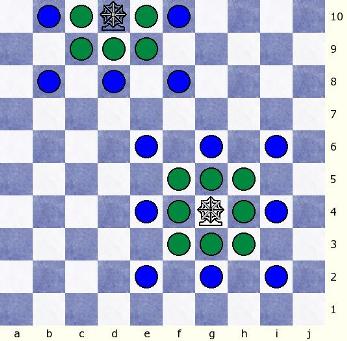
The Minister (enhanced Man or Commoner) is an additional minor piece to the Ajax Chessmen set that can move AND capture on their one-square moves (just like a Man, circles in green above) or can also do a two-step leap in any direction (Alfil+Dababah - circles in blue above).
Over The Board, Ajax Ministers are represented by handmade Prime Ministers (King pieces without the Cross Crown).
Any other fairy pieces though, or checkers men, can be used to represent the Ajax Ministers OTB.
The Ajax Minister is the latest re-incarnation of a piece that has been known before as Pasha (Paulovits's Game by István Paulovits - c.1890), Squire (Renniassance Chess by Eric V. Greenwood - 1980), Jumping General (Grand Shatranj) or Jumping King (Atlantean Barroom Shatranj) [both by Joe Joyce - 2006], and Mastodon or Mammoth (Mastodon and Mammoth Chess by Mats Winter 2006).
Ajax-Minister's Drops
Two Ajax-Minister's Drops are allowed per player on their first rank, per game. The Ministers must be dropped on any empty square on a player's first rank as their sole move in a turn; similar to dropping pieces in Shogi (Japanese Chess), except that the drops are limited to the first rank..There is no restriction as to when (opening, middlegame or endgame) do players need to drop their Ministers, or even a requirement to drop them (players may play without any Ministers if they choose).
Players can only drop ONE Minister per turn and the drops may not capture enemy pieces on the same turn.
The Algebraic Notation for a Minister's drop is: (Mxx) including the parenthesis.
Pawns
Pawns can play one or two squares in their initial move. They capture one square diagonally as in regular chess and may promote to any piece (Queen, Rook, Minister, Bishop or Knight) upon reaching their last rank.Rules
The goal of the game is to checkmate the opponent's King, as in Orthodox Chess.Rules for check, checkmate, stalemate, en passant, 50-move draw and Threefold Repetition Draw are like in Orthodox Chess.
Castling
Castling in Ajax Random Chess is à la Fischer Random. After castling the position of the King and the Rook would be the same as in Orthodox Chess.This table shows where the King and Rook end up and the notation for each type of castling.
| White castles a-side or long | c-castling | O-O-O | Kc1, Rd1 |
|---|---|---|---|
| White castles h-side or short | g-castling | O-O | Kg1, Rf1 |
| Black castles a-side or long | c-castling | O-O-O | Kc8, Rd8 |
| Black castles h-side or short | g-castling | O-O | Kg8, Rf8 |
Castling may only occur under the following conditions:
- Unmoved: The King and the castling Rook must not have moved before in the game, including a previous castling or a King's Bunker Leap.
- Un-attacked: All of the squares between the king's initial and final squares (including the initial and final squares) must not be under attack by any opposing piece.
- Vacant: All the squares between the king's initial and final squares (including the final square), and all of the squares between the rook's initial and final squares (including the final square), must be vacant except for the king and castling rook.
- Castling cannot capture any pieces.
- The king and castling rook cannot "jump" over any pieces other than each other.
- A player may castle at most once in a game.
- If a player moves his king or both of his initial rooks without castling, he may not castle during the rest of the game.
- The king may not be in check before or after castling.
- The king cannot move through check.
King's Bunker Leap (optional rule)
King's Bunker Leap is a new rule, based on the 'King to Bunker Leap', proposed by Charles Daniel in 2009.During the course of play, either side can move the King from their initial square to the square they would have landed after castling (c1 or c8 for Long Castling O-O-O, g1 or g8 for Short Castling O-O), by jumping over any friendly pieces if necessary.
The move can be carried out once per game, it takes a turn and is subject to similar restrictions to those in castling. The main difference is that a rook is not involved in the play and the King can make a one-time jump.
Instead of castling, a side can carry out the King's Bunker Leap, by moving from its initial square to the bunker squares on the c or g file (i.e. c1 or g1 for White, c8 or g8 for Black).
The King's Bunker Leap may only occur under the following conditions:
- Unmoved: The King must not have moved before in the game, including a previous Bunker Leap or Castling.
- Un-attacked: All of the squares between the King's initial and final squares (including the initial and final squares) must not be under attack or occupied, by any opposing piece.
- Vacant: The King's final square must be vacant.
- The King's Bunker Leap cannot capture any pieces.
- The King can only "jump" over friendly pieces.
- A player may do the King's Bunker Leap at most once in a game.
- If a player moves his King without doing a Bunker Leap, he may not do it during the rest of the game.
- The King may not be in check before or after a Bunker Leap.
- The King cannot jump through check.
- A King that has previously castled can no longer do a Bunker Leap for the rest of the game.
Kx>>yy
Where x is the departure square for the King, '>>' stands for 'Bunker Leap' and yy is the destination bunker square (c1, g1, c8, g8)
Example: Kc>>g1 stands for a King to bunker leap from c1 square to g1.
Notes
Game Courier Preset
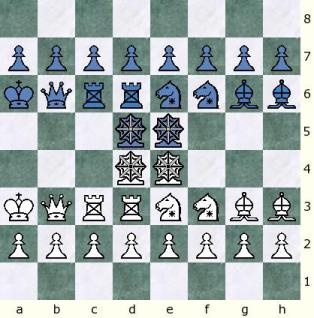 ....
.... ....
....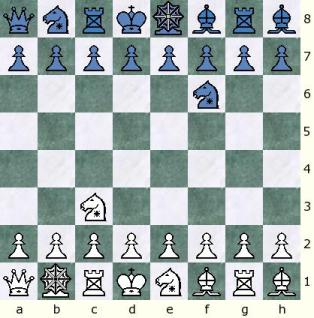
Initially in the Game Courier preset, all pieces (including the Ministers) will be placed in the 3rd to 6th ranks (above left).
When the game is created, the pieces (minus the Ministers) will be randomly placed on the players' 1st rank, and the Ministers will disappear (sample random position above middle).
To drop a Minister in Chess Courier use the notation: "M-xx" (for White) or "m-xx" (for Black), where "xx" is the square the Minister is being dropped at.
Sample position above right after: 1.Nc3 Nf3 2.(Mb1) (Me8)
Game Courier Preset
Ajax Random Chess -- Random Preset #2Ajax Orthodox Chess -- Orthodox Preset #2
Game Courier Logs
Game Courier Logs for Games of Ajax Random ChessGame Courier Logs for Games of Ajax Orthodox Chess
To see actual games that have been played on-line, follow the link above.
Ajax Random Chess (ARC) was created by José Manuel Carrillo-Muñiz, from Puerto Rico in 2009.
Chess Variants by the Author:
- Modern Random Chess (9x9)
- Contemporary Random Chess (8x8)
- Prime Ministers Chess (9x8)
- Modern Capablanca Random Chess (10x8)
- Modern English Random Chess (10x10)
- Pseudo-Modern Random Chess (9x9)
- Chess8400 (9x9)
- Prime Ministers Contemporary Random Chess (8x8)
- Prime Ministers Random Chess (9x8)
- International Contemporary Random Chess (10x10)
- International Fischer Random Chess (10x10)
- Courier Chess Moderno (12x8)
- Mini Courier Chess Moderno (10x8)
- Silver Elephant Chess (10x8)
- Modern Ministers Courier Chess (11x8)
- Ajax Chess (10x10)
- Ajax Modern Random Chess (9x9)
- Ajax-Capablanca Chess (10x8)
- Ajax Random Chess (8x8)
- Partnership Chaturanga (8x8)
Other Pages by the Author:
- How to Generate Random Positions
- The Bishop Adjustment Rule
- The Modern Principles
- Reverse Symmetry
- The Prime Minister
- The Courier Elephant
- The 10x8 Variants
- Modern Chess Preset
- Makruk (Thai Chess) Preset
 This 'user submitted' page is a collaboration between the posting user and the Chess Variant Pages. Registered contributors to the Chess Variant Pages have the ability to post their own works, subject to review and editing by the Chess Variant Pages Editorial Staff.
This 'user submitted' page is a collaboration between the posting user and the Chess Variant Pages. Registered contributors to the Chess Variant Pages have the ability to post their own works, subject to review and editing by the Chess Variant Pages Editorial Staff.
By Jose Carrillo.
Web page created: 2009-08-01. Web page last updated: 2009-11-29
